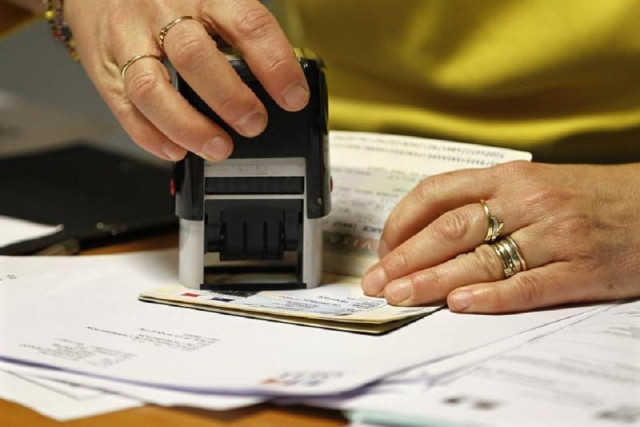Afghan Consulate stamp shortage ruining lives
Families separated, jobs lost due to a shortage at the consulate in Peshawar

Representational image. PHOTO: REUTERS
While Islamabad sometimes takes blame for tightening rules and regulations on border crossing and visa formalities, Kabul always seems to one-up the hindrances for Pakistani citizens, especially residents of Khyber-Pakhtunkhwa and the former Fata region.
The Afghan consulate in Peshawar entertained 150 to 200 Pakistanis from 9 to 10 o'clock, which included teachers of various institutions across Afghanistan, medical technicians, traders, and families intending to cross the border for a variety of reasons.
But despite several assurances from Islamabad and supporting Kabul’s stance in the peace dialogue, the consulate in Peshawar has provided almost no services to Pakistani citizens in the last month.
"My sister is married to an Afghan national. Her father-in-law died recently in Kunar province. We applied for visas for my family, but despite applying last month, the visa section told us that they are out of visa stickers, and we will have to wait. Meanwhile, those have paid several thousand rupees to a source in the consulate been issued visas," Jehanzeb Mohmand told The Express Tribune outside the consulate.
A teacher who been teaching English and linguistics in Kabul for the last seven months also complained to The Express Tribune. “I submitted my passport last month on April 1. I visited the consulate three times and the visa section just keeps telling me to come back after another five or ten days.”
He said he has lost his job in Kabul as a result of the delays, while the consulate keeps claiming that the stickers will arrive from Kabul via Dubai in the next few days, he said. Normally we get visas in three working days, he added, while opining that such delays create a bad impression.
Newly-married Pakistani nationals are also a regular sight at the Afghan consulate, mostly there for the registration of their marriages.
A consulate staff member, while asking not to be named, admitted that while the mission normally processes over 150 people a day, none have been processed in the last month because “we don’t have stickers”.
Bumpy history
An air of suspicion always hangs around Islamabad and Kabul’s interactions, even while Pakistan continues to invest in Afghanistan. Pakistan has recently constructed the Torkham-Jalalabad Highway, and a state-of-the-art hospital named after Muhammad Ali Jinnah, while Prime Minister Imran Khan has also expressed interest in building a cancer hospital in Kabul.
Despite the fact that Pakistan had also been hosting millions of Afghan refugees on its soil, mistrust is deeply rooted in Kabul, which continues to accuse Islamabad of being a safe haven for militants.
Pakistan often closes the borders with Afghanistan after skirmishes between the countries’ respective security forces and other diplomatic tensions, but still, new family relationships are built every day.
New horizons in relationships
Given its place in China’s Belt and Road Initiative and the planned US withdrawal from Afghanistan, Kabul will have to strengthen its ties with its immediate neighbours, and its continuing efforts to reach out to New Delhi would further bruise the relationship with Pakistan.
It is the need of the hour that Islamabad also expands and extends cooperation with Kabul post-US withdrawal as once the Belt and Road Initiative starts, regional countries would have to work with their neighbours for development, said foreign policy expert Professor Bakhtiyar Khan.
Trade with Afghanistan, which was once around $8 billion, has dropped to a couple of billion. We need trust development on both sides of the border, facilitation of businessmen, tension-free environments for diplomats, academia, and labour, Khan added.
Afghanistan should also facilitate Pakistani citizens to every extent, and its water war against Pakistan should be ended, he said, adding that Afghan foreign police should not be designed on New Delhi’s wishes.
"Public dealings are the essence of deeper-rooted diplomacy. While state-to-state is a very technical job, The Afghan government should facilitate Pakistani citizens for the sake of a sustainable relationship, Professor Bakhtiyar Khan stated.

1724319076-0/Untitled-design-(5)1724319076-0-208x130.webp)

















COMMENTS
Comments are moderated and generally will be posted if they are on-topic and not abusive.
For more information, please see our Comments FAQ